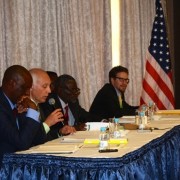
The United States Agency for International Development (USAID) and the Zambian Ministry of Mines, Energy, and Water Development joined private sector companies and civil society organizations to mark the final stages in the development of Zambia’s Renewable Energy Feed-In Tariff (REFIT) mechanism.

Good morning. It is my great pleasure to be here today on behalf of the United States Agency for International Development! I bring you greetings from the U.S. Ambassador to Zambia, Mr. Eric Schultz, and thank the Honorable Given Lubinda, Minister of Agriculture and Livestock, for opening this important two-day event. And I am delighted to note that the important innovations developed over the last four years through this program are the result of cooperative efforts between international and Zambian scientists, working together, in Zambia, to help the Zambian people.
Zambia is known for its gentle and peaceful people, incredible natural beauty, fertile soil, and vast mineral wealth. With an increase in copper prices and sound macroeconomic policies, Zambia’s economy started rising in the late 1990s and has averaged five to six percent Gross Domestic Product (GDP) growth over the past decade. Impressive macro-level performance, however, belies the reality facing most Zambians. Zambia’s new Sixth National Development Plan (SNDP) notes, “the economic growth experienced during the last decade has not translated into significant reductions in poverty and improved general living conditions of the majority of Zambians.” This is particularly true for rural Zambians where 80% of the population lives in poverty, of which 63% live below $1.25 per day. Health and education constraints limit the ability of many Zambians to fully participate in economic opportunity. Of Zambians between the ages of 15-49, 14.3% are HIV positive while nearly half of Zambia’s children under five are stunted. Barely 20% of Zambia’s learners finish secondary school, with girls particularly disadvantaged.
Sometimes I can’t help but be inspired. While Africa is a place of tremendous dynamism, diversity, opportunity, and progress, Africa’s success stories don’t attract attention. As the Assistant to the Administrator for Africa at the U.S. Agency for International Development, I have to spend a significant amount of my time dealing with problems: extreme poverty, conflict, disease, corruption. So when I have the chance to celebrate an experience that reveals the ideals and abilities of Africans, I want to tell that story.








Comment
Make a general inquiry or suggest an improvement.